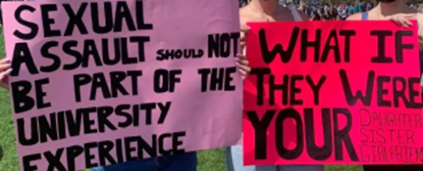Sexual Assault on College Campuses

Campus sexual assault is a difficult topic to talk about. As the parent of a teen daughter who will attend college soon, it is a frightening reality to face the fact that sexual assaults on college campuses occur at an alarming rate. Recent statistics indicate that 1 in 4 undergraduate females experience rape or sexual assault through force or incapacitation. Among those, 4 out of 5 don’t report it. Every parent must confront the fact that campus sexual assault is a pervasive problem within our system of higher education.
More so than in other ‘rape settings,’ victims of sexual violence taking place on college campuses are often blamed for their assaults, and perpetrators often escape justice. Unfortunately, while all colleges and universities understand the prevalence of sexual assault on campus and its physical, emotional, and educational impacts on its student victims, many fail to take effective steps to significantly reduce the incidence and address the harm.
Colleges often mishandle rape allegations, exposing victims to even more trauma. In many instances, the mishandling fuels the ‘rape culture,’ discouraging victims from reporting and emboldening offenders with the fact that there may be no consequences for their conduct.
Title IX
A victim who has been sexually assaulted by another student or university employee may have a claim under Title IX of the Education Amendments of 1972 (Title IX)— the federal civil rights law prohibiting sex discrimination in educational programs that receive federal funding. Title IX requires all public schools and any private schools to receive federal funds to combat sexual violence and harassment and accommodate survivors’ needs to ensure that they have equal access to educational opportunities. If the administration is made aware of an incident, colleges must take immediate steps to address the issue.
These actions may include issuing no-contact orders to the accused, making reasonable changes to schedules, housing arrangements, or extracurricular activities of the survivor; and otherwise protecting the right to an education that is free of violence, discrimination, or harassment.
If a school fails to take appropriate steps to protect the student, it can be liable for compensatory damages. Some institutions that have violated Title IX have had to pay significant damages and legal fees in cases brought to court.
Why Victims Rarely Report Sexual Assault
Despite how frequently sexual assault occurs on campus, few cases are reported to the school, and even fewer are reported to the police. There is a prevailing sense among victims that if they had been drinking, the university may be dismissive or blame them, and nothing will happen to the offender. Many decide that it is not worth the trauma of having to go through reporting and administrative proceedings. They also often fear that if they do report an assault, their names will be made public.
Damages College Students Suffer
We know that all victims of sexual abuse suffer short- and long-term health problems, such as sexually transmitted infections, depression, anxiety, eating disorders, chronic illness, and post-traumatic stress disorder. We also know that college students who have been sexually assaulted are more likely to engage in risky behaviors, such as binge drinking and drug use, and have lower academic achievement. They may also be at greater risk for revictimization.
Let Charles Boyk Law Offices Help
If you or a loved one has suffered the trauma of sexual assault or abuse, you do not have to suffer in silence. Let our compassionate team help you. Call today to speak with a caring advocate.

